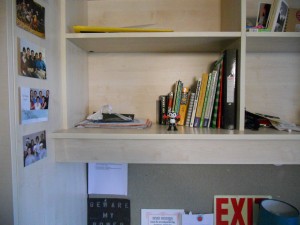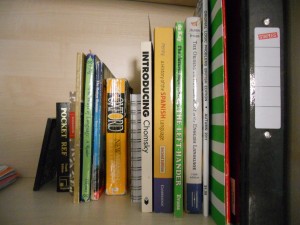There’s a big library on campus currently under noisy refurbishment, but this is not a list of that York Library. That would be a really long list, and I don’t think you would learn much from it. On the other hand, the books that I decided to carry across the ocean with me were chosen based on weight, relevance to the program, and proximity to my heart.
The Origins and Development of the English Language (Algeo & Pyles, 2005)
This was a textbook for my PSU class “The History of The English Language.” I never really got into it, but seems like a strong reference point for me to jump off from into a topic in more detail.
Horrible Histories: The Rotten Romans (Deary, 1994)
I really love this series of books. This was the first one I ever bought at a Sutter book fair, and it’s still my favorite. The timeline in the front really does give a better overview of the Roman Empire than most textbooks.
The Natural Superiority of the Left-Hander (de Kay, 1979)
Slightly more academic than The Left-Handed Book, it includes the fact that Gerald Ford was only left-handed when sitting down.
Pocket Ref (Glover, 2010)
I heard about this online, that it’s used heavily by the Mythbusters guy, Adam Savage. It is entirely too much technical information in the world, from the curve from child height to adult height, to a list of minerals sorted by hardness. It also has metric conversion tables, sign language, morse code, birthstones by month, and a lot of stuff I find to be vaguely helpful at various times.
Introducing Chomsky (Grovers & Maher, 2007)
It’s hard to read actual Chomsky, so I picked this up because it has a cartoonish way of going about it. I’ve tried starting it several times, but every page is a new topic, and nothing is covered in depth, as far as I’ve gotten.
The Oxford New Spanish Dictionary (Lea, 1999)
I believe this is the 2nd Spanish dictionary I’ve owned. I’ve highlighted a lot of strange words, I think it went to Mexico with me, and I’ve written similar verbs in the margins – teach/learn, seek/find, come/arrive, drown/strangle. (?)
Latin Dictionary (Ottenheimer Publishers Inc, 1964)
I’ve only taken 1 year of Latin, but every time I see a family crest or business motto, I want to know the basic meaning of each word, if not the relationship between them. Also, it is a TINY book.
Pocket Posh Crosswords (Parker, 2009)
My mom sent this to me in Portland, and it’s a good little book. I’ve probably done 20/75 of the puzzles. It’s a good waiting room book to have in your purse.
The History of Spanish (Penny, 2005)
This is the book I used to write my essay/presentation/post about the History of Spanish in 10 Words (see right column.) Very well written, with both large patterns of change explained as well as the time periods when specific vocabulary came into the language. I like it.
Original Logic Puzzles (PennyPress, 2011)
I like grid-type logic puzzles, figuring out what person bought what pet at the store on which day. I’m not always good at them, but I want to keep doing them. I want to make one of my own someday.
The Ways of Language: A Reader (Pflug, 1967)
This excellent series of articles is fantastic on its own, with one comically describing irregular verbs (it sounds crazy but its true). In addition, the articles written in the 60s criticize then-recently published dictionaries for including neologisms. Looking back from 2011, some of the words have become completely accepted while others have fallen away to history. I actually wrote about this book 3 years ago. It’s still good.
Semantics: The Magic of Words (Shanker, 1965)
This book is not about semantics. It’s about etymology, maybe morphology, but NOT semantics. I bought it at Powell’s, and it’s fabulous on several levels. It explains the original meanings of proper names as well as common terms, then has a workbook aspect at the end of each chapter.
Metric for Me! (Shoemaker, 1998)
I bought this book online when I started dreaming of studying in England, and it came with a bonus poster. The book is meant to be worked through with the help of a meter stick. I still need a meter stick, but the poster is now on my dorm wall, which has a full-size picture of a meter stick on it. That’s something I guess.
There are also a few empty little notebooks on that shelf, and the UK Road Atlas that Conn bought for me is the yellow thing on the shelf above. Thank you for visiting the library.
